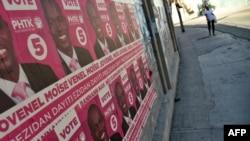A decision to postpone a presidential runoff in Haiti could help the leading candidate address what may be his greatest liability: Most voters know hardly anything about him.
Ads for Jovenel Moise have blanketed Haitian TV and radio for weeks and he has held rallies across the country. Social media users have been bombarded with campaign pitches and slick images of him working at a banana exporting venture or decorating a Christmas tree with his family.
Yet few feel they know the political newcomer, a businessman who had never run for office until he was hand-picked by outgoing President Michel Martelly.
Thus, many Haitians were surprised that Moise finished at the top of 54 candidates in first-round results. Opponents quickly alleged fraud by Haiti's electoral council and Martelly's political machine. A broad array of rights groups, local election monitors and others followed.
"It seems like hardly anybody knew who Jovenel was until, all of a sudden, he was the biggest candidate in Haiti," university student Samantha Nesley Jean Louis said beneath a billboard for Moise in Port-au-Prince, where many of his posters have been torn down by opposition demonstrators.
Haiti's Provisional Electoral Council this week postponed the December 27 runoff to allow a five-member commission to address swirling allegations of multiple voting and ballot tampering while also recommending ways to safeguard a final round's integrity.
There's a possibility that Moise could be eliminated from the next round after the review. If he remains, the extra time could give him the chance to address concerns about his candidacy in the deeply divided country.
Critics view his rapid ascent to prominence with suspicion, suggesting that Martelly is trying to keep a hand in the government after he leaves office by using the candidate as his proxy. Cartoons in Haiti's biggest newspaper have depicted the political novice with diapers and a pacifier.
Moise, who has described his rise as a "phenomenon," features a photo of himself with the president on his Twitter page and Martelly has vigorously endorsed the candidate at rallies. His campaign denied repeated requests for an interview.
Martelly has dismissed claims that he could be pulling strings from the shadows after he leaves office on February 7.
"I'm sure that as a president he will take the lead and decide based on his judgment," Martelly said in an interview this week with The Associated Press. He called Moise Haiti's "perfect candidate."
"He's the model for the new Haiti that we need. (He has) the entrepreneurial spirit that we need for our youth, that new dynamic that we need for our economy," the president said.
In tapping Moise, Martelly reached outside Haiti's intrigue-heavy political world. Before the campaign season started, former Haiti Prime Minister Laurent Lamothe had been expected to be the candidate for ruling party, Tet Kale, but he was disqualified.
The 47-year-old Moise may be new to politics, but he's not an unknown in Haiti's business world, once serving as secretary general of northeast Haiti's chamber of commerce. His first venture was an auto parts company in Port-de-Paix. He also distributed drinking water and created a project to bring renewable energy to several towns.
In 2014, he launched the Agritrans banana exporting joint venture with the government on about 2,470 acres (1,000 hectares) in northeast Haiti with a $6 million loan approved by Martelly's administration. He proudly refers to himself by his campaign moniker, "Neg Bannann" — Banana Man in Haitian Creole.
If Moise eventually wins, his legitimacy almost certainly will be challenged by opposition factions and other quarters that have condemned the elections so far.
But it's also easy to find citizens who respond to Moise's message of self-sufficiency in a country dependent on the outside world for nearly everything.
A group of men in a Port-au-Prince shantytown said they backed Moise because they thought he and Tet Kale offer the best hope for the economy.
"The old political class just taught the youth how to burn tires," said mechanic Joel Chicot, referring to a frequent tactic in protests. "Tet Kale has been bringing good changes for our country and Jovenel is our man." Several friends nearby began chanting: "Neg Bannann."
Peter Hakim, president emeritus of the Washington-based Inter-American Dialogue think tank, questioned why the Organization of American States and the U.S., which contributed over $30 million to this year's Haiti elections, have been so quiet about electoral fraud accusations that have been ratcheting up tensions for weeks. In early November, the OAS said preliminary results that showed Moise with about 33 percent of the vote were consistent with what their monitors observed, but they have been quiet since.
"I have no idea whether Moise won the first round honestly or not. What is clear is that many Haitians, maybe most, don't believe it," Hakim said.
Eduardo Gamarra, a politics professor at Florida International University who has conducted several Haiti polls since 2012, believes Moise is Haiti's legitimate leading candidate.
Gamarra, who was an adviser to Lamothe but now has no relationship with Haiti's government, said the fraud allegations stem more from the inefficacies of the voting process and the electoral council's ineptitude.
"The reality is that Haiti is extraordinarily inefficient in carrying elections out," Gamarra said.





